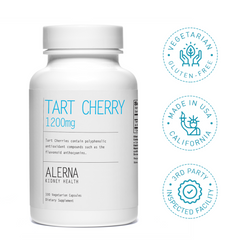-
Gout is primarily caused by high levels of uric acid, necessitating targeted management strategies.
-
Essential vitamins such as Vitamin C, E, D, and B vitamins, alongside omega-3 fatty acids, potassium, and cherry extracts, play significant roles in managing gout by reducing uric acid levels and inflammation.
-
Dietary and lifestyle changes, including reducing purine-rich foods and incorporating anti-inflammatory foods, are crucial for maintaining healthy uric acid levels and preventing gout flares.
-
Choosing the right vitamin supplement involves considering quality, bioavailability, and potential interactions with existing medications under the guidance of healthcare professionals.
-
A comprehensive approach to gout management combines dietary supplements, proper nutrition, and lifestyle modifications, supported by professional advice for optimal health outcomes.
Gout, a condition characterized by painful and swollen joints, is more than just an occasional nuisance; it's a signal from the body that something is amiss with uric acid metabolism.1

With millions suffering from this condition worldwide,11 understanding gout's underlying causes, its management, and how dietary supplements can aid in its treatment has never been more critical.
This comprehensive article explores the pivotal role vitamins play in managing gout, offering hope and direction for those looking to mitigate this condition's impact on their lives.
Gout 101: What Causes Gout?
Gout arises from an accumulation of uric acid crystals within the joints, a byproduct of purine metabolism.
While purines are present in all body cells and many foods, excessive levels can lead to uric acid buildup, precipitating crystal formation in joints and tissues.1 This process triggers the severe gout pain commonly reported in the big toe and can also affect other joints like the feet, fingers, wrists, elbows, knees, or ankles.
Factors contributing to high uric acid levels include dietary choices, obesity, certain medical conditions, and genetic predisposition, highlighting the need for a multifaceted approach to prevention and management.2
The Importance of Gout Management
Effectively managing gout is not merely about alleviating the immediate discomfort of gout attacks but also addressing the long-term risk factors associated with elevated uric acid levels.
Without proper management, gout can progress to chronic gout, leading to more frequent attacks, joint damage, and the development of tophi.3
Moreover, high uric acid levels are associated with other serious health issues, such as kidney stones and cardiovascular diseases, underscoring the critical nature of maintaining healthy uric acid levels for overall well-being.
The Best Vitamins For Gout Management
Beyond conventional treatments and lifestyle modifications, gout supplements play a pivotal role in controlling the symptoms and underlying causes of gout.
These nutrients help manage uric acid levels in the blood, a critical factor in gout attacks, and support the body's overall health.

Vitamin C
Vitamin C, known for its potent antioxidant properties, is a crucial nutrient in the fight against gout. Research indicates that vitamin C can lower uric acid levels and reduce the risk of gout attacks.4
By enhancing the kidneys' ability to excrete uric acid and protecting cells from free radical damage, supplemental vitamin C offers a dual approach to gout management.
While vitamin C supplements shows promise in preventing gout in individuals without a history of the condition, its efficacy in those already suffering from gout requires further investigation.
Vitamin E
Although not directly involved in uric acid metabolism, Vitamin E's anti-inflammatory properties can benefit individuals with gout.
By reducing inflammation around the joints affected by uric acid crystals, Vitamin E can help alleviate gout symptoms, making it a valuable component of a comprehensive gout management plan.5
B Vitamins
B Vitamins, particularly Vitamin B5 (pantothenic acid), may play a role in managing gout by influencing uric acid levels.
While research on their effectiveness is still emerging, these vitamins are essential for overall health and could indirectly contribute to better gout management through improved metabolic functions.6
Vitamin D
Emerging evidence suggests a link between Vitamin D deficiency and increased susceptibility to gout. Vitamin D plays a crucial role in immune function and inflammation modulation, which could be beneficial for individuals with gout.7
Ensuring adequate Vitamin D intake through diet, supplementation, or controlled sun exposure may help manage gout more effectively.
Additional Nutrients That Aid in Gout Management
Beyond the well-discussed vitamins, certain nutrients stand out for their potential to further alleviate gout symptoms and contribute to overall joint health.
Omega-3 Fatty Acids
Omega-3 fatty acids, renowned for their anti-inflammatory properties, can be instrumental in managing gout.8
Found abundantly in cold-water fish like salmon, mackerel, and sardines, as well as in fish oil supplements, omega-3s help reduce the intensity of gout flares and ease joint pain.
By incorporating these healthy fats into your diet, you may experience a decrease in the frequency of acute gout attacks and an improvement in overall joint health.
Potassium
Potassium plays a crucial role in helping the kidneys filter uric acid, thus potentially reducing the risk of gout attacks. High potassium levels can help alkalize the urine, promoting the excretion of uric acid.1
Foods rich in potassium, such as bananas, oranges, potatoes, and spinach, should be considered valuable components of a gout management diet.

Cherries and Cherry Extract
Cherries, particularly tart cherries, have been shown to lower serum uric acid levels and reduce inflammation, making them a natural ally in the fight against gout.9
Research suggests that consuming cherries or tart cherry extract, such as Alerna Kidney Health's Tart Cherry Supplement, can significantly reduce the risk of gout attacks.9
The anti-inflammatory and antioxidant properties of cherries may help mitigate gout symptoms and provide a delicious way to manage the condition.
Diet and Lifestyle Changes
Embarking on a journey to manage gout effectively requires more than just medication—it necessitates a holistic approach that includes significant diet and lifestyle changes.
Modifying your diet to avoid high-purine foods and embracing lifestyle habits that promote overall health can profoundly impact your ability to manage gout.2
Balancing Diet with Supplements
While vitamins and supplements play a crucial role in gout management, they should complement, not replace, a balanced diet. A diet low in purines is recommended for individuals with gout, as purines can increase uric acid levels.2
Incorporating foods that naturally cause serum uric acid reduction, alongside dietary supplements, can create a comprehensive approach to managing gout.
Lifestyle Factors
Lifestyle adjustments are paramount in managing gout effectively. Regular exercise, maintaining a healthy weight, and staying hydrated can significantly impact uric acid levels. Minimizing alcohol consumption, especially beer and spirits high in purines, can help prevent gout flares.
Adopting these lifestyle changes, in conjunction with appropriate dietary modifications, can enhance the effectiveness of gout management strategies.
How to Choose the Right Vitamin Supplement
The efficacy of a supplement is not just about what it contains but how your body absorbs and utilizes it. Here are some key considerations for choosing vitamin supplements that support gout management, ensuring you make informed decisions to complement your gout treatment plan.
Quality and Bioavailability
The quality and bioavailability of vitamin supplements are critical factors to consider when selecting products for gout management. High-quality supplements, which are readily absorbed and utilized by the body, ensure that you're receiving the maximum benefits from the nutrients. Look for products that have undergone rigorous testing and are produced in facilities that adhere to high manufacturing standards.

Consulting with a Healthcare Provider
Before integrating any new vitamin supplements into your regimen, consulting with a healthcare provider is essential. A healthcare provider can offer personalized advice based on your health history, current medications, and specific needs related to gout management.
This guidance is invaluable in selecting the most appropriate supplements to complement your gout treatment plan, ensuring safety and efficacy in managing the condition.
Precautions and Potential Interactions
When considering supplements for gout management, it's essential to be aware of potential precautions and interactions. Supplements can offer significant benefits but must be used judiciously to avoid adverse effects, especially for individuals with underlying health conditions or those taking other medications.
Possible Side Effects
While supplements like Vitamin C, omega-3 fatty acids, and tart cherry extract are generally safe for most people, they can cause side effects in some cases.
High doses of Vitamin C may lead to gastrointestinal disturbances, such as diarrhea or stomach cramps. Omega-3 supplements might interact with blood clotting and cause excessive bleeding in sensitive individuals.
Similarly, concentrated cherry extract, while beneficial for reducing uric acid levels, may cause stomach discomfort or diarrhea if consumed in large quantities.
Interaction with Medications
Supplements can interact with prescription medications, potentially altering their effectiveness. For instance, Vitamin C intake might interact with certain blood thinners, affecting their potency. Omega-3 fatty acids could enhance the effect of antihypertensive medications, leading to blood pressure that is too low.
Always consult a healthcare provider before starting any new supplement to ensure it won't interfere with your existing medication regimen.
When to Seek Medical Advice
Seek medical advice if you experience sudden, severe gout attacks, notice an increase in the frequency or intensity of attacks, or if you have concerns about how supplements may interact with your medications.
If you're considering a new supplement regimen for gout management, discussing it with a healthcare provider is crucial to ensure it's appropriate for your specific health needs and conditions.
How Alerna's Uric Acid Supplements Can Help
Alerna Kidney Health offers a range of supplements designed to support individuals managing gout:
Uric Acid Support
This uric acid support supplement is formulated to help maintain healthy uric acid levels, potentially reducing the frequency of gout attacks. It may include ingredients known for their uric acid-lowering effects, providing a natural approach to gout management.
D-Mannose
While primarily known for supporting urinary tract health, D-Mannose might also aid in overall kidney function, indirectly impacting uric acid excretion and gout management.10
Tart Cherry
Rich in antioxidants and possessing anti-inflammatory properties, tart cherry extract can help reduce uric acid levels and alleviate the symptoms of gout attacks.9 This supplement harnesses the natural power of cherries to support joint health and reduce inflammation.
Before adding any supplements to your regimen, please consult with a healthcare provider to ensure they align with your health needs and current treatments.
Conclusion: Integrating Supplements to Your Gout Management Journey
Supplements can play a significant role in managing gout, offering a complementary approach to traditional medication and dietary changes. Understanding the potential precautions, side effects, and interactions with medications is crucial.
By choosing high-quality supplements and consulting with healthcare professionals, individuals with gout can navigate their treatment options more effectively, aiming for reduced attacks and improved quality of life.
Always prioritize safety and efficacy, and consider supplements as part of a holistic approach to gout management.
Frequently Asked Questions
What is the best vitamin for gout? Vitamin C is highly regarded for its ability to help manage uric acid levels and prevent gout attacks.
Can supplements cure gout? While supplements can aid in managing gout symptoms and reducing uric acid levels, they should be used as part of a comprehensive treatment plan rather than a standalone cure.
Are cherries really effective against gout? Yes, cherries, particularly tart cherries, have been shown to lower uric acid levels and reduce the frequency of gout attacks.
How can I safely integrate supplements into my gout treatment plan? Consult with a healthcare provider to ensure that any supplements you consider are safe and beneficial for your specific situation.
Can lifestyle changes really make a difference in managing gout? Absolutely, lifestyle changes, including dietary modifications, weight management, and reducing alcohol intake, are critical in effectively managing gout.
Medical Disclaimer:
The information provided in this article is for educational and informational purposes only and should not be considered a substitute for professional medical advice, diagnosis, or treatment. Please consult with your healthcare provider before starting any new dietary supplement, especially if you are pregnant, nursing, have a medical condition, or are taking other medications. Never disregard professional medical advice or delay in seeking it because of something you have read in this article.
References:
-
Ragab, G., Elshahaly, M., & Bardin, T. (2017). Gout: An old disease in new perspective - A review. Journal of advanced research, 8(5), 495–511. https://doi.org/10.1016/j.jare.2017.04.008
-
Yokose, C., McCormick, N., & Choi, H. K. (2021). The role of diet in hyperuricemia and gout. Current opinion in rheumatology, 33(2), 135–144. https://doi.org/10.1097/BOR.0000000000000779
-
Engel, B., Just, J., Bleckwenn, M., & Weckbecker, K. (2017). Treatment Options for Gout. Deutsches Arzteblatt international, 114(13), 215–222. https://doi.org/10.3238/arztebl.2017.0215
-
Choi, H. K., Gao, X., & Curhan, G. (2009). Vitamin C intake and the risk of gout in men: a prospective study. Archives of internal medicine, 169(5), 502–507. https://doi.org/10.1001/archinternmed.2008.606
-
Juraschek, S. P., Gaziano, J. M., Glynn, R. J., Gomelskaya, N., Bubes, V. Y., Buring, J. E., Shmerling, R. H., & Sesso, H. D. (2022). Effects of vitamin C supplementation on gout risk: results from the Physicians' Health Study II trial. The American journal of clinical nutrition, 116(3), 812–819. https://doi.org/10.1093/ajcn/nqac140
-
Zhang, Y., & Qiu, H. (2018). Folate, Vitamin B6 and Vitamin B12 Intake in Relation to Hyperuricemia. Journal of clinical medicine, 7(8), 210. https://doi.org/10.3390/jcm7080210
-
Nimitphong, H., Saetung, S., Chailurkit, L. O., Chanprasertyothin, S., & Ongphiphadhanakul, B. (2021). Vitamin D supplementation is associated with serum uric acid concentration in patients with prediabetes and hyperuricemia. Journal of clinical & translational endocrinology, 24, 100255. https://doi.org/10.1016/j.jcte.2021.100255
-
Zhang, M., Zhang, Y., Terkeltaub, R., Chen, C., & Neogi, T. (2019). Effect of Dietary and Supplemental Omega-3 Polyunsaturated Fatty Acids on Risk of Recurrent Gout Flares. Arthritis & rheumatology (Hoboken, N.J.), 71(9), 1580–1586. https://doi.org/10.1002/art.40896
-
Collins, M. W., Saag, K. G., & Singh, J. A. (2019). Is there a role for cherries in the management of gout?. Therapeutic advances in musculoskeletal disease, 11, 1759720X19847018. https://doi.org/10.1177/1759720X19847018
-
Gettman, M. T., Ogan, K., Brinkley, L. J., Adams-Huet, B., Pak, C. Y., & Pearle, M. S. (2005). Effect of cranberry juice consumption on urinary stone risk factors. The Journal of urology, 174(2), 590–801. https://doi.org/10.1097/01.ju.0000165168.68054.f8
- Murdoch, R., Barry, M. J., Choi, H. K., Hernandez, D., Johnsen, B., Labrador, M., Reid, S., Singh, J. A., Terkeltaub, R., Vázquez Mellado, J., & Dalbeth, N. (2021). Gout, Hyperuricaemia and Crystal-Associated Disease Network (G-CAN) common language definition of gout. RMD open, 7(2), e001623. https://doi.org/10.1136/rmdopen-2021-001623















